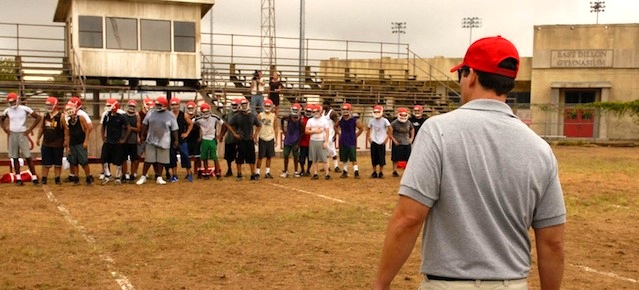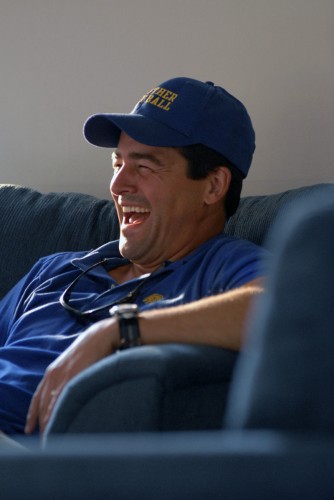
 A belated but no less heartfelt bravo to Jason Katims and Kyle Chandler who won long overdue awards for their work in Friday Night Lights at the 2011 Emmy’s. And what better way to mark the occasion than to recall one of our favorite Coach Taylor moments?
A belated but no less heartfelt bravo to Jason Katims and Kyle Chandler who won long overdue awards for their work in Friday Night Lights at the 2011 Emmy’s. And what better way to mark the occasion than to recall one of our favorite Coach Taylor moments?
This one comes in Season 4 Episode 5– minor spoiler alert – just after former quarterback (and boyfriend of the coach’s daughter) Matt Saracen learns that his father died while serving in Iraq. Matt had a conflicted relationship with his father – to say the least – and for a while after receiving the news, appears to be taking it rather stoically. Then, over dinner at the Taylor’s house, he completely falls apart. He admits, “I hate him. And I don’t like hating people. But I just put all my hate on him so I don’t have to hate anybody else… That’s all I want to say. I just want to tell him to his face that I hate him. But he doesn’t even have a face. I’m sorry.” And then he runs out the door.
Coach Taylor, without batting an eye, goes after him. He calls Matt’s name and catches up to him. After a few moments of silence, Coach says, “I’m going to walk you home.” He doesn’t ask or equivocate. He makes no attempt to plaster over Matt’s grief with platitudes or advice or even awkwardness or a macho stiff upper lip. He puts his arm around the grieving young man and walks with him. Coach Taylor is simply there, right beside Matt in the absolute worst moment, allowing him the space to feel his pain, and that’s enough. It’s an incredibly powerful scene, one of the very best in a series full of them (would that youtube would allow it to be uploaded!).
This is not the only time Coach Taylor functions as a figure of Grace, but it is one of the most palpable. As we’ve pointed out before, Coach Taylor is not God; Katims made sure to give him plenty of problems of his own. But Taylor is wise enough to know that for many of the young men (and women) in his care, he might as well be. This is the main reason why the series hit so many Grace-notes. But it also makes for an incredibly difficult role to “sell” without coming across as aloof or superhuman or self-aggrandizing, all of which Chandler somehow avoided. His portrayal rang true and set the tone for the whole series – it dug deep without ever attracting attention to itself. Some call it superb naturalistic acting, others might call it a vocation. I call it a miracle, and I applaud, Emmy or no.
What were your favorite Coach Taylor moments?
While we’re at it, a not-so-quick soundbite from an excellent post-mortem interview with showrunner Jason Katims, whose approach to television sounds – surprise, surprise – remarkably Taylor-like:
One of the things I often hear your counterparts at other shows say is that there is nothing more boring to watch than a happily married couple. And you have spent five years proving how ridiculous that statement is with Coach and Mrs. Coach. What was the secret to that? What did you understand that nobody else seems to? Is it Kyle and Connie? The writing? What?
I would say there’s two things. When you look at the success of that marriage, you have to start with Kyle and Connie and what they did with those roles. They had incredible chemistry together, they had such integrity about how they approached each of their roles and their relationship. I think a lot of it is that. The other thing I would say is that we tried to approach the stories with them in a way that would be real conflict – real things that would come up. And I do believe that within a marriage and within a good marriage, there are always challenges to that. There are always conflicts, where you don’t wind up on the same page of things. And we explored many of those things. There was a tremendous amount of conflict between Eric and Tami over the years. It was just that the conflicts didn’t feel put upon. We didn’t go to the place of having them have affairs, or having an alcohol problem, or a divorce. We didn’t want to go there, we didn’t particularly believe that this couple would be going through those things, and we found conflicts within the things you wouldn’t think of as a big storyline. The idea of whether or not to buy a house was a story you wouldn’t necessarily think, “That’s a story I want to see on TV,” But what they did with that story was they made it incredibly real, and it became much more than the house – it became where they found themselves at this age, at this time, and would the dream be something they would ever be able to capture. These are things that people can relate to. We tried to stay with material where we knew how great Kyle and Connie would be, so it would be honest and real. Try to find real conflicts between them and not lean into melodrama.
One of the things that made the show great was that rawness of emotion, in moments like Matt staring at his father in the coffin. Did that just come from the filming style you used, or was there more to it than that? And are there ways other shows can learn from that, or do you think that rawness in any way helped prevent the show from being a bigger hit than it was – that people don’t want to feel that deeply about the characters they watch at 8 o’clock on NBC?
The reason why some of these moments resonated as they did was a combination of several things. I think the incredible cast, I think the writing and directing, but I do think that a part of it is that the filmmaking process, the vocabulary of how we shot really allowed us as an audience to really get inside this world in a way that sometimes you don’t. Sometimes a lot of filmmaking doesn’t allow you to be as intimately there in the space with these characters as our show did. And also the filmmaking style allowed the actors to expand on what was in the script and improvise and live in these moments, and never know when the camera was on them for the close-up, or whether it was on them at all. They never knew, and that was really a part of it. They were able to exist in the moment and not have to think about the artifice of what they were doing. They didn’t have to worry about the technical part of being an actor at times and free themselves to be inside the moment. I do think that was a part of it.
To read our other posts on FNL, go here.

COMMENTS
7 responses to “The Pastoral Ministry of Coach Eric Taylor”
Leave a Reply














Well deserved! He (not Riggins) was/is the heart of the show.
Coach was definitely the heart of the show. But Riggins turned out to be pretty great, too.
very well deserved. Favorite E. Taylor moment – either the arc with Smash (specifically the scene where coach drags him onto the practice field at TMU (?)) or the way he navigates the first few episodes as head coach of east dillon (forfeiting the game)